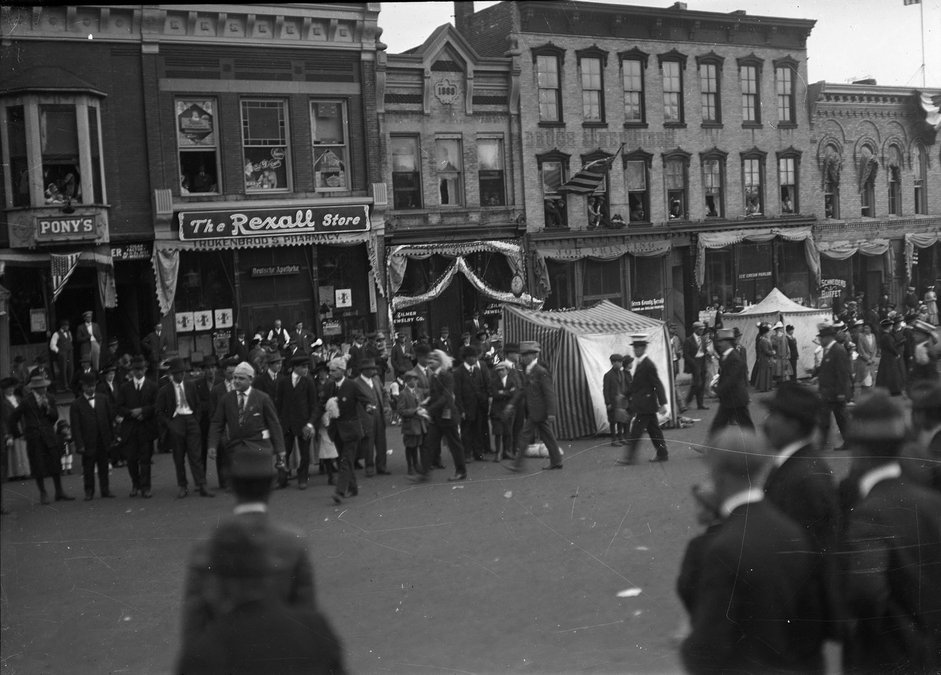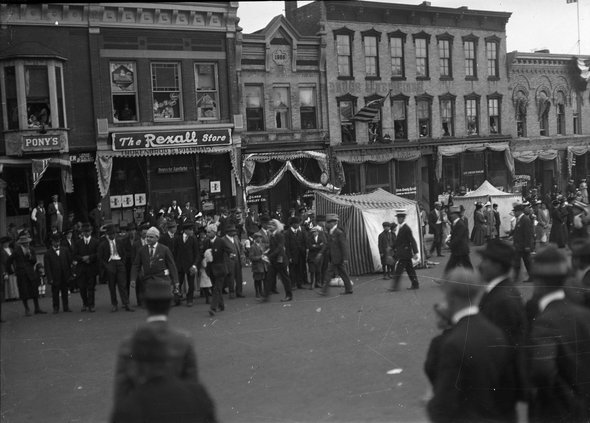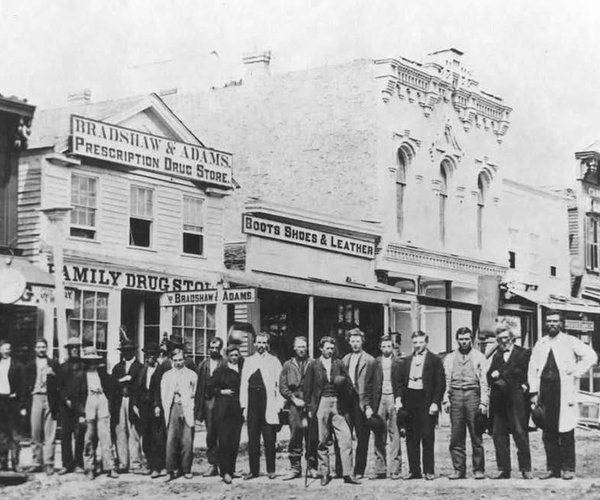When I saw Joe Hillary downtown a couple months ago, he shared that he came across something interesting while he was renovating an apartment in his building on 17th Avenue. He had discovered a broken Monroe Shoe Peg cigar box and was surprised to find out that there were several cigar manufacturers in Monroe decades ago. I was familiar with this brand since the Green County Historical Society has some cigar boxes from those local manufacturers. I couldn’t give him any specifics that day, but I did do some looking as soon as I got home to my computer.
The first thing I found was an advertisement from a January 1899 issue of the Swamp Angel, a relatively unknown local newspaper. The ad simply said, “It is of no use trying. You cannot get better five cent cigars than Geo’ Walker’s Pony and Shoe Peg.” From there, I looked to find more information about Mr. Walker. The 1900 census showed that he was born in England in 1853 and was married there about 1875 and had five sons and four daughters. Their oldest son, Gèorge, was born there in 1879. His obituary said they immigrated to Boston when he was two years old before moving to Manchester, New Hampshire for a short time. It was there that Eliza was born in February 1883. The rest of the children were born after they moved to Wisconsin, first living in Albany before moving to Monroe about 1886.
A sad article in 1887 shared that Gèorge and Anna had another son who drowned in a wash tub of water which was sitting on the ground behind the house. That son was two years old and had been playing with the other children. He was found bent over the tub with his head in the water and his feet on the ground. Mr. Walker was in Janesville that day and received a telegraph of the horrific news.
An article in the Monroe Sentinel on February 20, 1889 stated, “George Walker expects to remove his tobacco factory to south side public Square, next to Bolender & Co’s — east.” The city directory that year verifies his location, with five competitors also listed. The Walkers purchased the Ed Ball place on the southeast corner of 11th St. and 18th Avenue, where city hall now sits. The Sentinel stated that it was “a nice lot and convenient for Mr. Walker’s business.” However, the family made their home there instead. They paid $1,600 for the 70- by 112-foot lot.
It was reported in 1889 that two years earlier Walker had invented two brands of cigars, “Improved Pets” and “Pony.” They had become “general favorites” and their demand was constantly increasing; “they are undoubtedly the best five-cent cigars in the market.” The Ponies were small, fine flavored genuine Havana cigars that were favorites with light smokers. “George has such prospects, that he feels warranted in investing in real estate in the town that has made his cigars famous. Everybody smokes Walker’s Pets or Ponies, who can enjoy a good, clean, five cent smoke.”
It was shared in May 1893 that George Walker’s Smoke Palace, his cigar store and factory, had “been recently renovated and polished.” No microbes were allowed “to roost around George’s store.” An advertisement in July stated that the ponies were put up in cedar boxes and had “elegant flavor.” Another ad in November 1894 stated that ‘the choicest of stock’ was used in placing these goods on the market. It added, “It is not often that you can get a choice, handmade, Havana filled cigar for a nickel.”
The Walkers sold their home to Julius B. Galusha in April 1900 for $1,500 and purchased the Galusha’s home on the southeast corner of 14th Avenue and 9th Street for $3,500 at the same time.
It was shortly after this that things started to change for Walker. He filed a suit in Justice Ruegger’s court in April 1902 against Mr. Dawson, proprietor of the Monroe House for about nine months. Walker alleged that Dawson owed him $147 on a cigar bill. Dawson was losing money every day because the “rent and other expenses of running the hotel were way out of proportion to the patronage.” It is not known what else went on in the next few years.
Walker then purchased the Headquarters saloon on the northeast corner of the Square from Emanuel Knoeri in August 1904. He sold it again the following May to Otto Schmidt, Monroe, and his brother, Charles, Elgin. Walker returned to cigar manufacturing.
Walker may have felt much pressure because of his business dealings, so he left Monroe shortly after the sale. Rumors said that he had taken $3,000 in cash and planned to go back to England. He had walked to Clarno where he boarded a train for Freeport. His son, George, then accompanied him from Freeport to Rockford. The son said his father was in need of rest and wanted to spend a few days in Chicago. Being a nervous man, it was “thought that he [had] become unstrung by worry over business and family affairs.” It was said at the time that he had backed out of selling his saloon after a verbal agreement, but there is no evidence of that. His family was “much concerned over his disappearance, yet feel that he will soon return.”
Walker’s friends were asked to look after his business, “which was left in a solvent condition.” George, Jr. took over the cigar business for at least a year. The couple, who lived in Chicago at the time, sold their home to Charles Chambers, who owned the property next to it, for $3,000 in November. Nothing is known about the rest of the Walkers’ lives, but he died in Seattle in 1910 and she in 1922 in San Francisco.
The cigar box that Joe found was probably from the time that Ed Lipchow manufactured the Shoe Peg cigars. He had worked for Walker in 1885 and “was still making his famous Shoe Peg cigars 62 years later.”
— Matt Figi is a Monroe resident and a local historian. His column will appear periodically on Saturdays in the Times. He can be reached at mfigi48@tds.net or at
608-325-6503.



